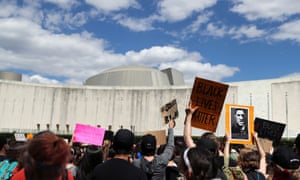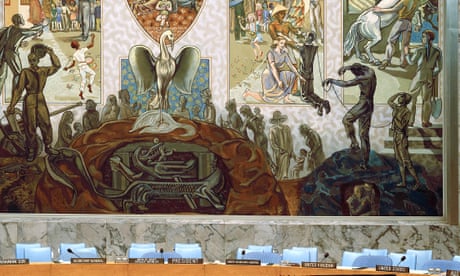Global development
It's time the UN faced up to its treatment of black people like me
Rosebell Kagumire
An honest conversation about race has to recognise the marginalisation and exploitation of many aid workers
An honest conversation about race has to recognise the marginalisation and exploitation of many aid workers
Global development is supported by
About this content
Mon 6 Jul 2020

Mon 6 Jul 2020

Demonstrators hold placards in front of the UN headquarters in New York during a protest against racial inequality in the aftermath of the death of George Floyd. Photograph: Jeenah Moon/Reuters
The global push for racial justice following the death of George Floyd in the US has resulted in a flurry of solidarity statements from within the international aid industry, including the UN.
After a shaky start, where its secretary general, António Guterres, was forced to backtrack on a note to staff that suggested they shouldn’t participate in Black Lives Matter (BLM), UN People of African Descent (Unpad) launched a survey to “allow staff to provide data, including on the extent of perceptions of systemic inequality inside the UN, its manifestations, and the responsiveness of the organisation to reports of incidents of systemic racism”.
The survey made me reflect on my experience during a short stint at a UN agency several years ago. I was on a consultancy contract (like so many young people) to formulate and drive social media campaigns. I carried my idealism to the job, and during that time worked on humanitarian crises in the Mediterranean, in west Africa during the Ebola outbreak, and in emergencies in Syria, Yemen, Iraq, Nigeria, South Sudan and Burundi.

'What does the UN stand for?': anger follows memo on anti-racism protests
But far from the rosy image of an industry “doing good”, I felt I was treated as a token black woman in a largely white male institution. I witnessed the racist treatment of black staff who were seen as diversity hires.
One case I’m aware of involved a new recruit from a conflict country who was tasked with producing a key document for the unit – a big ask for someone coming from outside the organisation. A few days in, a supervisor, a European white man, said: “If she doesn’t have my strategy by the end of the day I will put her on the next plane back.” She had literally fled that country, bullets raining, and survived as a refugee before joining the organisation.
I and others tried to use the internal system to report the abuse. We were informally advised that since we were on a consultancy contract such complaints would hurt our future opportunities.
Several years after I left the agency, the #MeToo movement drew the world to the struggle against structural sexism and the persistent unequal power that enables and sustains sexual abuse. Then #AidToo emerged, targeted at aid agencies that allowed abuse of power, sexual misconduct, sexual exploitation and a toxic environment for both aid workers and the women and girls they worked with. The revelations exposed the lack of oversight and systems of accountability in the sector.
At the time, black women and many from the global south asserted that it was disingenuous to speak about the exploitative aid sector without probing the systemic racism. Black people and people of colour, both in the industry and in the countries where most of the aid work is carried out, experience an amalgamation of abuse of power, systemic sexism and white supremacy.
But little, if anything changed, in the sector. Until George Floyd’s death, which saw an outpouring of solidarity statements with BLM. The very agencies that silenced us now tweet about diversity.
Seeing the new tone from the agencies, I shared my experience of racism in the sector, and several former and current UN employees got in touch.
“They wanted my contribution but not my voice at the table because they wanted me to act like I don’t see the injustice,” said a Haitian former colleague.
“I was the department help and made to feel that I must feel grateful to be sitting at the table. The department’s toxic culture eventually got me fired because I refused to act grateful and demanded to be treated equally and to be heard. Eventually, I was no longer allowed at the table and was silenced,” said a former colleague from southern Africa.
“There have been several reports against these white men in positions of power, but they only rotate them, nothing is done … A white intern can become your supervisor in the blink of an eye, and they will always tell you ‘budget’, but the same budget is not an issue for white people,” said a current employee.
A woman of colour who recently resigned cited among other issues “preferential treatment, bias recruitment and the obvious structural racisms”.
The “deep and sincere discussion” about racism Guterres seeks must recognise the historic marginalisation and exploitation of black people and people from the global south within its agencies.
In its 75th year, it is time for the UN to dismantle the unequal power at its heart. It’s an enormous challenge. So enormous that the UN must open itself up to outside scrutiny. Self-reflection is not enough of an intervention.
• Rosebell Kagumire is a writer and award-winning blogger
The global push for racial justice following the death of George Floyd in the US has resulted in a flurry of solidarity statements from within the international aid industry, including the UN.
After a shaky start, where its secretary general, António Guterres, was forced to backtrack on a note to staff that suggested they shouldn’t participate in Black Lives Matter (BLM), UN People of African Descent (Unpad) launched a survey to “allow staff to provide data, including on the extent of perceptions of systemic inequality inside the UN, its manifestations, and the responsiveness of the organisation to reports of incidents of systemic racism”.
The survey made me reflect on my experience during a short stint at a UN agency several years ago. I was on a consultancy contract (like so many young people) to formulate and drive social media campaigns. I carried my idealism to the job, and during that time worked on humanitarian crises in the Mediterranean, in west Africa during the Ebola outbreak, and in emergencies in Syria, Yemen, Iraq, Nigeria, South Sudan and Burundi.

'What does the UN stand for?': anger follows memo on anti-racism protests
But far from the rosy image of an industry “doing good”, I felt I was treated as a token black woman in a largely white male institution. I witnessed the racist treatment of black staff who were seen as diversity hires.
One case I’m aware of involved a new recruit from a conflict country who was tasked with producing a key document for the unit – a big ask for someone coming from outside the organisation. A few days in, a supervisor, a European white man, said: “If she doesn’t have my strategy by the end of the day I will put her on the next plane back.” She had literally fled that country, bullets raining, and survived as a refugee before joining the organisation.
I and others tried to use the internal system to report the abuse. We were informally advised that since we were on a consultancy contract such complaints would hurt our future opportunities.
Several years after I left the agency, the #MeToo movement drew the world to the struggle against structural sexism and the persistent unequal power that enables and sustains sexual abuse. Then #AidToo emerged, targeted at aid agencies that allowed abuse of power, sexual misconduct, sexual exploitation and a toxic environment for both aid workers and the women and girls they worked with. The revelations exposed the lack of oversight and systems of accountability in the sector.
At the time, black women and many from the global south asserted that it was disingenuous to speak about the exploitative aid sector without probing the systemic racism. Black people and people of colour, both in the industry and in the countries where most of the aid work is carried out, experience an amalgamation of abuse of power, systemic sexism and white supremacy.
But little, if anything changed, in the sector. Until George Floyd’s death, which saw an outpouring of solidarity statements with BLM. The very agencies that silenced us now tweet about diversity.
Seeing the new tone from the agencies, I shared my experience of racism in the sector, and several former and current UN employees got in touch.
“They wanted my contribution but not my voice at the table because they wanted me to act like I don’t see the injustice,” said a Haitian former colleague.
“I was the department help and made to feel that I must feel grateful to be sitting at the table. The department’s toxic culture eventually got me fired because I refused to act grateful and demanded to be treated equally and to be heard. Eventually, I was no longer allowed at the table and was silenced,” said a former colleague from southern Africa.
“There have been several reports against these white men in positions of power, but they only rotate them, nothing is done … A white intern can become your supervisor in the blink of an eye, and they will always tell you ‘budget’, but the same budget is not an issue for white people,” said a current employee.
A woman of colour who recently resigned cited among other issues “preferential treatment, bias recruitment and the obvious structural racisms”.
The “deep and sincere discussion” about racism Guterres seeks must recognise the historic marginalisation and exploitation of black people and people from the global south within its agencies.
In its 75th year, it is time for the UN to dismantle the unequal power at its heart. It’s an enormous challenge. So enormous that the UN must open itself up to outside scrutiny. Self-reflection is not enough of an intervention.
• Rosebell Kagumire is a writer and award-winning blogger

No comments:
Post a Comment